Publications funded by IRJI
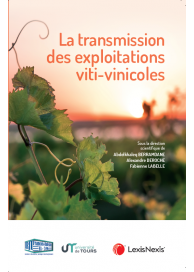 The transmission of winegrowing estates
The transmission of winegrowing estatesEditeur : LexisNexis
ISBN : 978-2-7110-3469-7
Parution : 11/2020
The multidisciplinary research project "SEPAGE", financed by the Centre-Val de Loire region, has made it possible to explore almost forty narratives of winegrowing trajectories and practices, particularly through the complex question of the transmission of the winegrowing business. From a legal point of view, such a study certainly provides a better understanding of the wine industry and its issues. It also makes it possible to discover, or even propose, the development of tools that can directly benefit the professionals concerned. With this ambition in mind, this book brings together the proceedings of the colloquium which took place in Tours on 15 November 2019 and which brought together numerous legal experts specialising in viticultural issues. After an introduction reporting the results of the field survey conducted among winegrowers in the Centre-Val de Loire region, the first part is devoted to the private aspects of the transfer, while the second part deals with the public aspects. The academic contributions are complemented by those of regional practitioners. The whole presents not only a rich synthesis of the state of our positive law and of the evolution of practices in terms of the transfer of the winegrowing business, but also of the means to perpetuate this heritage and this work tool in the heart of our regions. Under the scientific direction of Abdelkhaleq BERRAMDANE, Alexandre DEROCHE, Fabienne LABELLE. Contributors to this book include: Raphaèle-Jeanne, AUBIN-BROUTÉ, Xavier AURIAULT, Elie BARBEREAU, Abdelkhaleq BERRAMDANE, Hubert BOSSE-PLATIÈRE, Samuel BRENNETOT, François CAZIN, Alexandre DEROCHE, Fabienne LABELLE, Sabrina LE NORMAND-CAILLÈRE, Jean-Christophe MANDARD, Marie MANDEVILLE, Michel PECH, Ronan RAFFRAY, François ROBBE, Séverine TAPHINAUD, Luc TESSIER
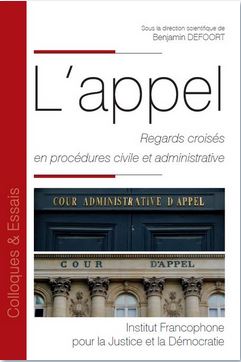 The appeal - Crossed Perspectives in Civil and Administrative Proceedings - Edited by Benjamin Defoort
The appeal - Crossed Perspectives in Civil and Administrative Proceedings - Edited by Benjamin DefoortPublisher: Institut Francophone pour la Justice et la Démocratie
ISBN : 978-2-37032-251-7 - Parution : 05/2020
Summary: The appeal system is a means of recourse which, in principle, is open to litigants in any legal system, in order to challenge a court decision. Today, however, it stands at a crossroads. In administrative litigation, the originality of the Judge of Appeal lies in the fact that s/he was only very belatedly attributed to courts specifically entrusted with this task (i.e. Administrative Courts of Appeal), the thirtieth anniversary of which was recently celebrated. Some of its characteristics can thus be sought between the model that traditionally constitutes the civil appeal, and that inherited from the historical role of the Council of State as the judge of last resort. But it was precisely during this same period that the regulatory authorities, in a series of decrees in May 2017, modified the system of appeal in civil matters, following on from the deeper reform of 2011. In so doing, both the office of the appeal judge and access to it have been adversely affected. These texts herald other reforms; in which directions will they go? Will they also concern the administrative court system? Will they be anticipated, accompanied or qualified by the case law of the civil and administrative courts? Will the latter be inspired by the new directions of civil appeal? These are all questions that were usefully submitted to the civil law and public law specialists present during this study day. Proceedings of the study day organized on 5 October 2018 by the IRJI François-Rabelais (EA 7496) of the University of Tours.
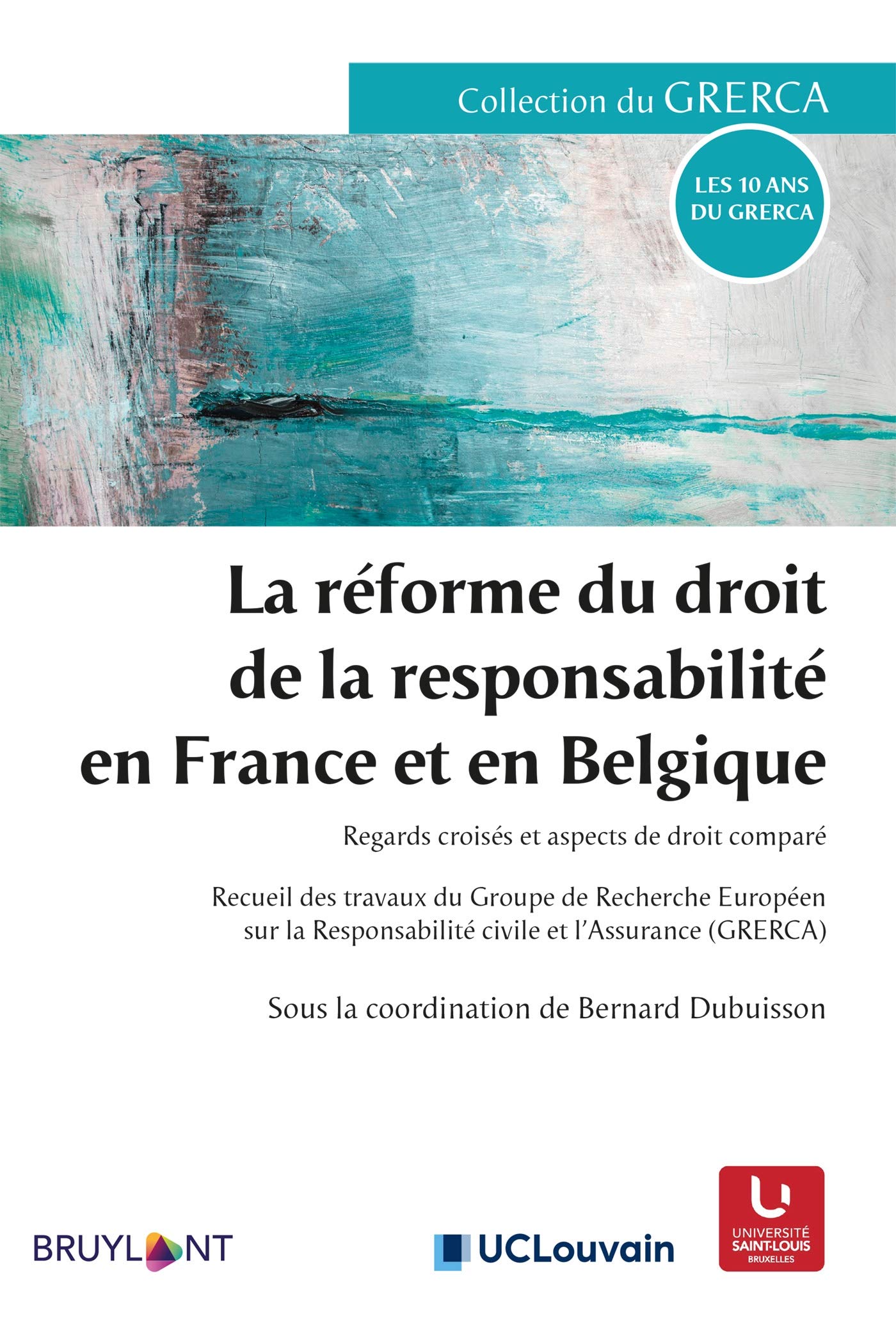 The Reform of Liability Law in France and Belgium - Crossed Perspectives and Aspects of Comparative Law - Studies coordinated by Bernard Dubuisson
The Reform of Liability Law in France and Belgium - Crossed Perspectives and Aspects of Comparative Law - Studies coordinated by Bernard DubuissonPublisher: Bruylant
ISBN : 978-2-8027-6433-5 - Parution : 05/2020
Summary: This book is the result of a seminar of the European Research Group on Liability and Insurance Law (GRERCA), organized by the Centre of Private Law, UCLouvain with the support of the University Saint-Louis-Bruxelles, on the occasion of the tenth anniversary of the foundation of this international research network. In keeping with current legal developments, the seminar, which was held in Brussels on 7-8 December 2018, was entirely devoted to examining the draft reforms of civil liability in France and Belgium. These two countries have, in fact, successively begun the vast task of reforming their Civil Codes, whose origins are common and date back to the Napoleonic Code of 1804. In France, the contractual dimension of the law of obligations has already been reformed by the order of 10 February 2016. From the point of view of civil liability, a preliminary draft had been submitted in February 2016. Following public consultation, a new draft was submitted by the Minister of Justice on 13 March 2017. In Belgium, the reforms of the law of evidence and property law have been adopted and will soon come into force. The law of obligations and the law of liability were to follow but this momentum was broken by the fall of the government on 18 December 2018. These two important areas of private law therefore remain for the time being at the draft stage. With respect to civil liability, the draft prepared by a working group appointed by the Minister of Justice was submitted in March 2018 and reviewed in August 2018 following public consultation. As the two reforms launched in parallel were in progress, the time was particularly well chosen to compare the two texts from an academic point of view. The present book is based on the reports presented at the seminar, updated in 2020. Moving away from the usual GRERCA practice, each topic addressed (general considerations, facts giving rise to liability, relationship between contractual and extra-contractual liability, damage and effects of liability) is, first, the subject of a French report and a Belgian report. These reports are then enriched by comparative law viewpoints put forward by professors coming from various universities of the European Union, whether or not they are part of the GRERCA network. All of them give rise to interesting and welcome ideas in a very hectic political and health care context.
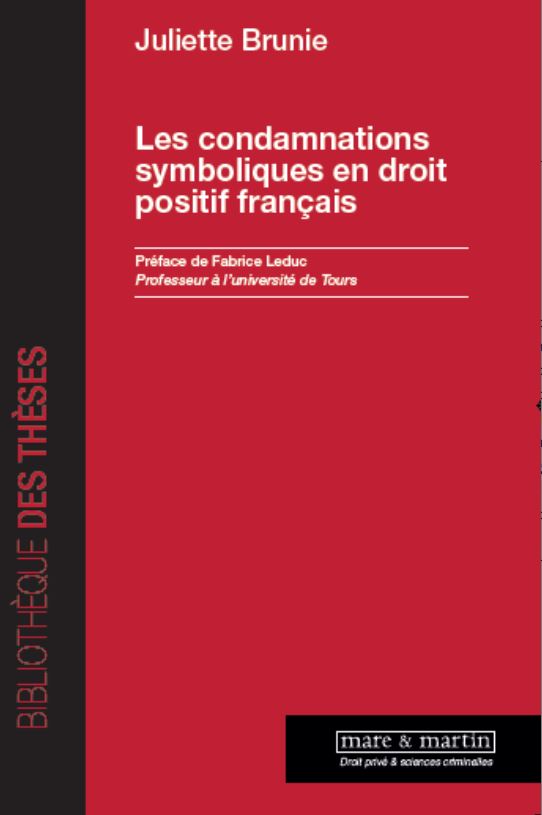 Symbolic sentences in French positive Law - Juliette Brunie
Foreword by Fabrice Leduc
Symbolic sentences in French positive Law - Juliette Brunie
Foreword by Fabrice LeducPublisher: Mare & Martin
ISBN : 978-2-84934-482-8 - Parution : 04/2020
Summary: When hearing the expression “symbolic sentence”, the jurist immediately thinks of the victim of a prejudice who obtains one euro in symbolic damages. However, beyond this intuition, symbolic sentences remain unknown. The first question that comes to mind is: are they limited to symbolic damages? The answer is no. The author of a criminal offence who is found guilty but is exempted from punishment, the reduction to 1€ of the amount of compensation provided for in a contract as a penalty clause or the annulment by the highest courts of court decisions in the sole interest of the law also illustrate the widespread use of symbolic sentences in French positive law. Hence a second question: what is or are their purpose(s)? As no comprehensive summary research has yet been carried out on these sentences, this book uses the concrete study of symbolic sentences and the experience of foreign legal systems to discover the multiple facets of a growing phenomenon.
 Numbers and Law - Edited by Marion Brosset Briand, Antonin Crinon, Élodie Delacoure and Émilie Delcher
Numbers and Law - Edited by Marion Brosset Briand, Antonin Crinon, Élodie Delacoure and Émilie DelcherPublisher: L’Harmattan
ISBN : 978-2-343-19575-9 - Parution : 02/2020
Summary: The choice of the theme “Numbers and Law” was based on the observation that numbers, understood lato sensu as what is quantifiable, have taken up a considerable place in the field of law. Their importance can also be seen, for example, by the introduction of numerical targets, performance indicators and other quantitative imperatives in law. A term derived from the management sciences - New Public Management - and from economics, along with terms such as governance, regulation, efficiency, is also gradually invading the field of law. This incursion seems to be affecting every part law: international (setting greenhouse gas emission thresholds, etc.), European (Treaty on Stability, Coordination and Governance, etc.), national (LOLF, etc.) or local (allowance for functions, hardship and expertise of civil servants, etc.). It even influences the office of the judge (proportionality control, “cost/benefit” balance, etc.). So the aim of this book is to take stock of this penetration of economics, management and mathematics, in the legal sphere in order to understand if – and if so how - it is a factor in changes to the law. This book brings together the academic contributions of young researchers, doctoral students and PhDs, proposing varied and multidisciplinary legal approaches. It is the result of the colloquium organized on 23 November 2018 by Hémisphère Droit, an association bringing together doctoral students and young doctors from the University of Tours. List of contributors: Vassil Bézier, Jennifer Bomstain, Marion Brosset Briand, Akassi Brou, Antonin Crinon, Élodie Delacoure, Émilie Delcher, Ahmed Elkahwagy, Alexis Lecatelier, Léa Lucienne, Benjamin Mosny, Pierre Mouzet, Adeline Paradeise, Paulien Parinet, Théo Scherer, Marion Travers.
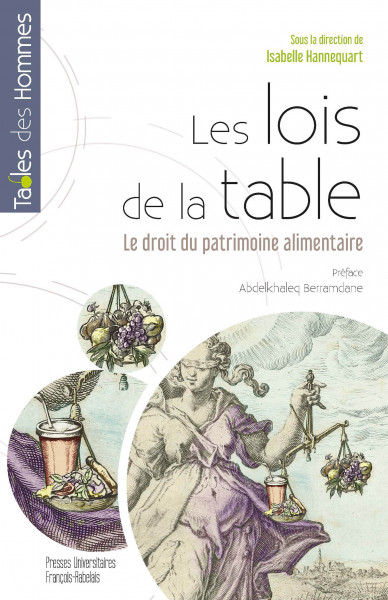 Rules of the Table - The Law of Food Heritage - Under the direction of Isabelle Hannequart-
Foreword by Abdelkhaleq Berramdane
Rules of the Table - The Law of Food Heritage - Under the direction of Isabelle Hannequart-
Foreword by Abdelkhaleq BerramdanePublisher: Presses Universitaires François-Rabelais – Tours
ISBN : 978-2-86906-733-2 - Parution : 02/2020
Summary: Feeding oneself, eating, eating good food and eating well, these acts of daily life are legal acts. The law has its own language to tell us about food laws. However, it does not provide a definition of food heritage, a notion shared by many other related disciplines. Rules of the table echo our culture, the gastronomic meals of the French, and also manifest themselves through the many labels of intellectual property. Ingredients of food heritage can be found in the different areas of law according to patrimonialisation processes with very different foundations. A joyous heritage, no doubt, but must food heritage also be a virtuous heritage responding to a growing societal demand for a quality heritage by taking into consideration the environment, biodiversity, health, animals, collective preferences, human rights, etc. To what extent can food heritage deal with patent or trademark protection? Food heritage requires legal protection. But protection is not necessarily based on a patrimonial intention and purpose. Too fatty, too salty... too regulated?! Nor should the law nip food heritage in the bud, but rather draw the contours of a new judicial synthesis; the right to food heritage, at the heart of cultural diversity, itself the common heritage of humanity.
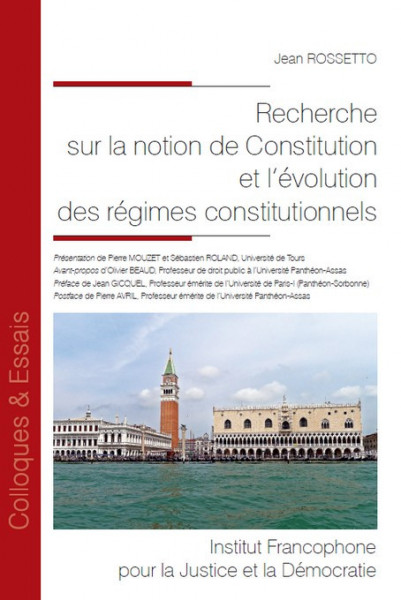 Research on the notion of Constitution and the evolution of constitutional regimes - Jean Rossetto
Research on the notion of Constitution and the evolution of constitutional regimes - Jean RossettoPublisher: Institut Francophone pour la Justice et la Démocratie
ISBN : 978-2-37032-249-4 - Parution : 01/2020
Summary: “The divorce frequently observed between the prescriptions drafted and their subsequent implementation is a phenomenon inherent in the very nature of constitutional norms and their conditions of interpretation. Whether unilateral or joint, the institutional practice which is established as soon as a Constitution comes into force, expresses nothing other than its interpretation by the public authorities. It emerges on the basis of the virtualities contained in the text, whose meaning and scope it thus determines. Two essential factors condition this operation. On the one hand, the various competences available to the constituted bodies; on the other hand, the political context which informs their faculties of interpretation. Consequently, the physiognomy taken by a political regime depends on the mode of distribution of powers adopted and the environment in which it has to be applied.” Almost forty years later, the idea expressed by Jean Rossetto in his PhD has lost none of its power or relevance.
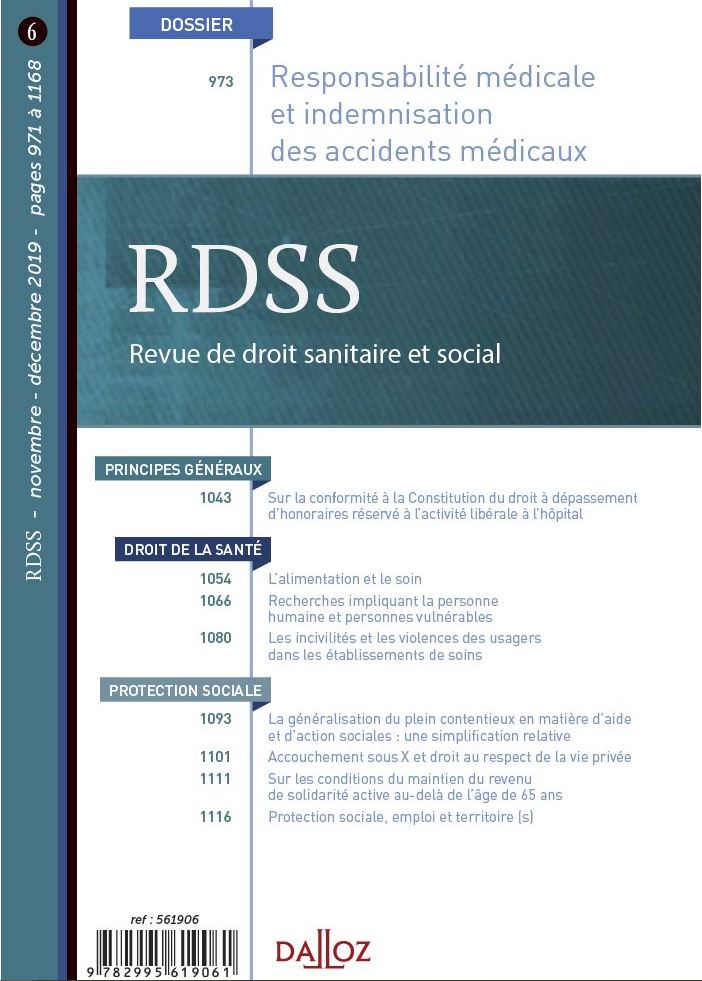 Medical liability and compensation for medical accidents. Edited by Farida Arhab-Girardin
Medical liability and compensation for medical accidents. Edited by Farida Arhab-GirardinPublisher: Dalloz - Revue de droit sanitaire et social n° 6/2019
ISSN : 0245-9469 - Parution : 10/2019
Summary: The Kouchner Act of 4 March 2002 on patients’ rights and the quality of the health system represents an undeniable step forward in the compensation of bodily injury. Indeed, it creates an innovative compensation scheme for medical damage in various ways. First of all, it redefines and unifies the rules of medical liability by giving fault a major role. Secondly, for reasons of national solidarity, it enshrines a right to compensation for medical accidents that are not seen as faults (“the therapeutic hazard”), although this is subject to a condition of seriousness. Finally, it sets up a system of conciliation and compensation commissions for the amicable settlement of culpable and non-culpable medical damage in order, in particular, to divert disputes in this area but also to simplify and speed up the procedure. More than fifteen years after coming into force, have the objectives pursued by the legislator been achieved? Are the rights of victims better preserved? In order to answer these questions, the speakers first looked at the latest developments in medical liability. The introduction of a unitary system of administrative and civil liability presupposed an identical interpretation of the legislative provisions. Has such harmonization and stabilization of the rules been achieved? What about the criminal liability of health professionals? The focus of the debates, for many years, on compensation of damages cannot hide the existence of criminal litigation. Secondly, it was a question of assessing the system of compensation for non-culpable medical accidents through national solidarity and of the various compensation procedures. The speakers wondered about the interpretation of the conditions of compensation for therapeutic risks. Is it really favorable to the victims or, on the contrary, too restrictive? The discussion then moved on to the choice of compensation procedure. By introducing a procedure for the amicable settlement of medical damages, the legislator intended to improve the situation of victims. Yet, its attractiveness has been called into question. However, the system introduced in 2002 was a considerable step forward that has inspired other European legislation. In this context, and with reference to the Franco-Polish program on medical liability of the Universities of Tours and Lödz, a Polish perspective was presented on the compensation of medical accidents. Finally, the discussions focused on compensation for personal injury as well as the impact of the civil liability reform project on this issue.
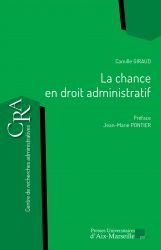 Luck in Administrative Law - Camille Giraud
Luck in Administrative Law - Camille GiraudPublisher: Presses Universitaires d’Aix-Marseille
ISBN : 978-2-7314-1138-6 - Parution : 10/2019
Summary: “Luck” is a heterogeneous notion in Administrative law. Indeed, it can be interpreted in several different ways such as chance, probability or risk, each of which can have different practical applications as well as, unsurprisingly, different consequences. However, this lexical diversity does not mean luck is invisible, given that the emergence and reactions of luck can be systematized by those who oversee the daily functioning of the administration and its relations with its citizens. For the administrative judge and the legislator, probabilities are always an illustration of the fact that luck can be a useful tool in establishing judicial truth in a situation of uncertainty. For the administrative judge and the legislator, chance and risk systematically refer to the occurrence of unforeseeable events or phenomena that must be avoided. There is therefore a “good” form of luck that they use, and a “bad” form of luck that they reject. Despite all the subtleties deployed by luck in administrative law, it nevertheless reveals itself as a notion whose unity appears at the stage of the study of the function common to all its appearances. While probabilities help the administrative judge to determine more precisely the amount of compensation for a loss of health chances and to increase the reparable damages, chance and risk are rejected by the administrative judge and the legislator in such a way that their repercussions on the individuals concerned are compensated by an indemnity. Luck is therefore a functional concept and it is likely it will be increasingly used to improve the compensation provided to citizens, both from a qualitative and quantitative point of view.
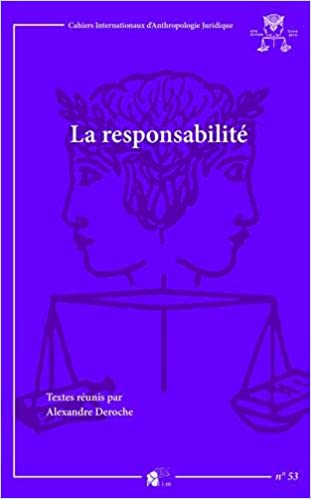
Liability - Proceedings of the The International Study Days of the History of Law Society of Tours (1-4 June 2017) - Texts collected by Alexandre Deroche
Publisher: Presses Universitaires de Limoges - Pulim
ISBN : 978-2-84287-737-8 - Parution : 06/2019
Summary: “Any act of a person, which causes damage to another, obliges he whose fault was the cause of the damage, to repair it”. This article 1384 of the French Civil Code, which became article 1240 in 2016, is an anthological text, undoubtedly the most famous in matters of liability. It is a cardinal concept of law in many national traditions although liability does not only concern civil law. It is equally important in other branches of law - criminal, administrative or constitutional - in which it has always played an important role, and increasingly does so. Liability does not only have a rich present and a bright future, it also has a long past, which, despite the brilliant historical work that has already been devoted to it in various languages, contains many grey areas. In order to throw new light on this question, around sixty academics came together at the memorable International Study Days of the History of Law Society held in Tours in 2017. The present collection provides the reader with the essence of the debates, hoping to fill gaps in scientific knowledge and to stimulate new avenues of research.
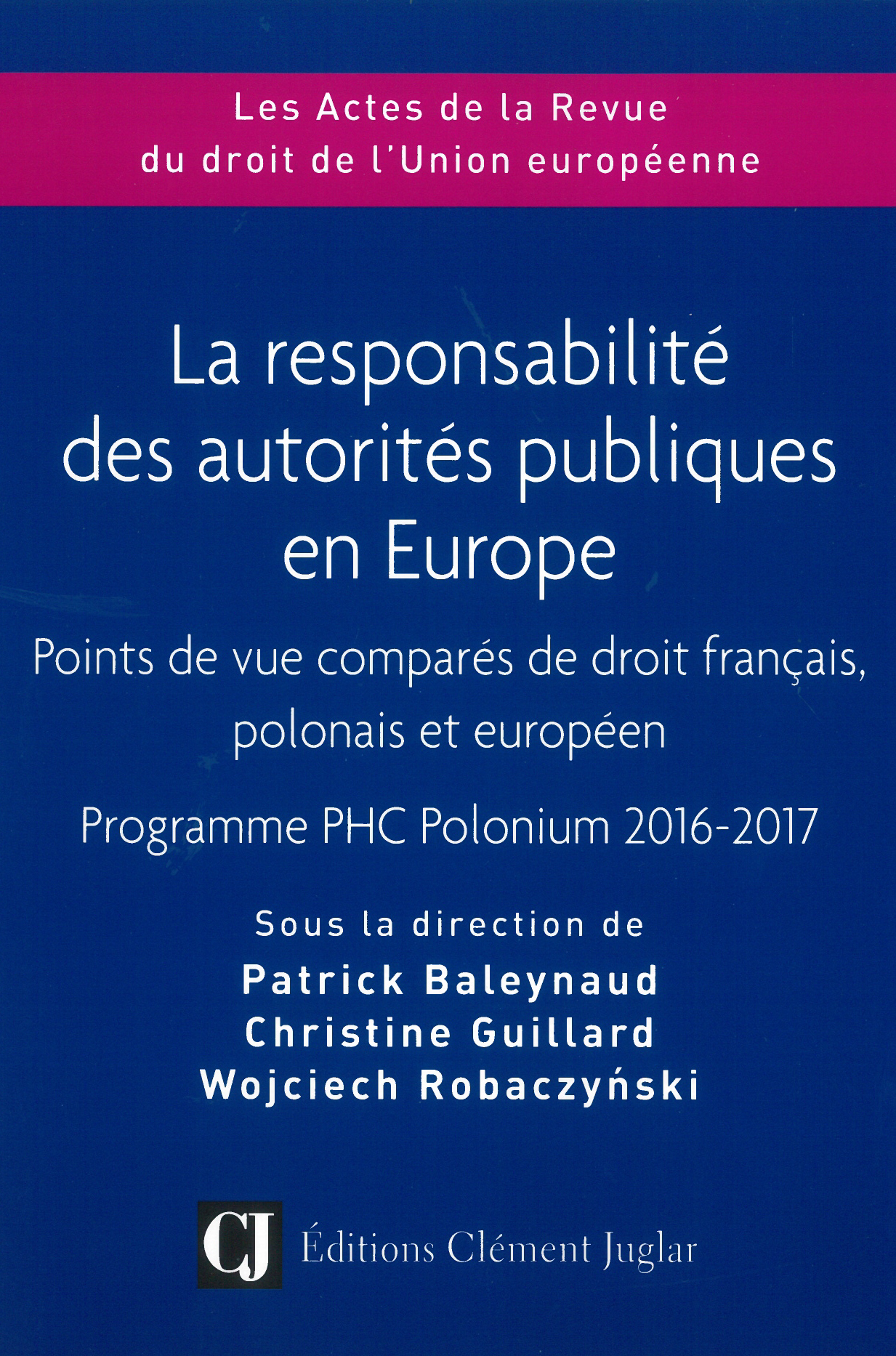 « The Responsibility of Public Authorities in Europe - Comparative Views from French, Polish and European Law”, Polonium 2016-2017 CHP Programme
« The Responsibility of Public Authorities in Europe - Comparative Views from French, Polish and European Law”, Polonium 2016-2017 CHP Programme Edited by Patrick Baleynaud, Christine Guillard, Wojciech Robaczyński
Publisher: Éditions Clément Juglar
ISBN : 978-2-908735-32-1
Release date: 05/2019
Summary: Originating both in the Constitution of the Republic of Poland of 2 April 1997 and in the reform of the Civil Code enacted 17 June 2004, the responsibility of public authorities is a relatively new and sensitive topic for Polish lawyers. Without being directly tied to European law, the reform coincided with the country's accession to the European Union and found itself in confrontation with both European Union law and with that of other Member States, which are more familiar with liability regimes specific to public authorities. This is what prompted researchers from Tours and Łodź to undertake collective research project, selected as part of a Polonium program, a Franco-Polish Hubert Curien Partnership (HCP), piloted in Poland by the National Agency for Academic Exchange (Narodowa Agencja Wymiany Akademickiej) and in France by the Ministries of Europe and Foreign Affairs and Higher Education, Research and Innovation. The proceedings show that the French and Polish liability regimes, although very different, are faced with similar issues and are gradually moving closer together, under the more or less visible influence of European law.
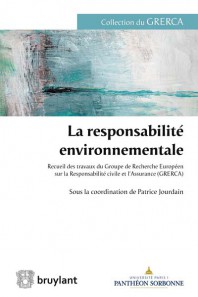 La responsabilité environnementale
La responsabilité environnementale“Environmental responsibility” (La responsabilité environnementale) Compendium of the work of the European Research Group on Civil Liability and Insurance (GRERCA) Edited by Patrice Jourdain
Publisher: Bruylant
ISBN : 978-2-8027-6138-9
Parution : 10/2018
Summary: Environmental protection is one of the major challenges of the 21st century. Everyone is already adversely affected by air pollution and global warming. More seriously, the multiplication, over the last few decades of natural disasters due to climate disorder is evidence of the need to take action to ensure the survival of populations in the long term. Despite certain obstacles, international awareness has emerged which has led States to make various international commitments to protect the planet. In addition to such preventive action, it is important to consider repairing the damage caused to the environment. In the European Union, a directive of 21 April 2004 on environmental liability, with regard to the prevention and reparation of environmental damage, has been transposed into the domestic laws of the various member States. Moreover, national laws have, for some time now, implemented their own legislative resources and case law to prevent and repair environmental damage.
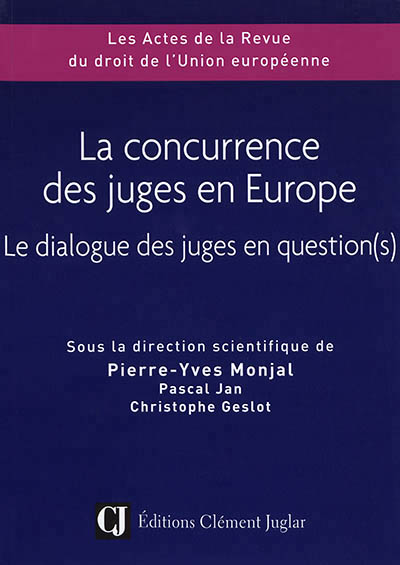 “Competition between judges in Europe: the dialogue of judges in question(s): Proceedings of the international conference in Tours, 25-27 November 2015”, Eds. Pierre-Yves MONJAL, Pascal JAN, Christophe GESLOT
“Competition between judges in Europe: the dialogue of judges in question(s): Proceedings of the international conference in Tours, 25-27 November 2015”, Eds. Pierre-Yves MONJAL, Pascal JAN, Christophe GESLOTPublisher: Clément Juglar
Collection : Les actes de la revue du droit de l’Union européenne
ISBN : 978-2-908735-28-4
Parution : 06/2018
Summary: For several decades, the dialogue of judges has been the term used by jurists to understand and enable understanding of inter-jurisdictional and inter-systemic relationships, both at national and European level. Several studies have been produced on this topic, including recent ones. The question of competition between judges is an attempt to mobilise jurists by going beyond or at least reorienting this reading of inter-jurisdictional relations. The concept of competition, no doubt more exploitable in a normative & positive sense than that of dialogue, is also a reminder that the courts are instituted powers. [...]
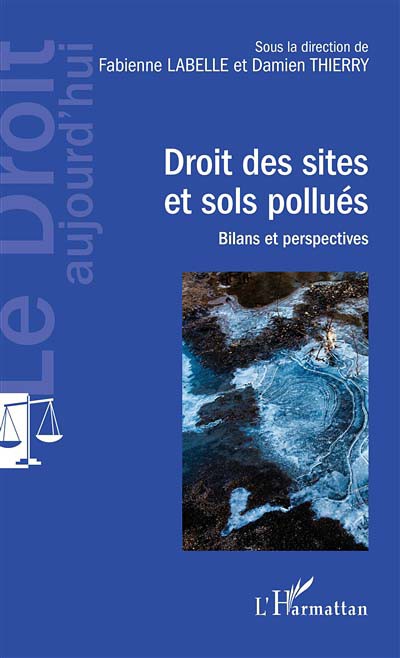 Law of polluted sites and soils. Balance sheets and outlook
Law of polluted sites and soils. Balance sheets and outlookEds. Fabienne LABELLE and Damien THIERRY
Publisher: L’Harmattan
Collection : Le droit aujourd’hui
ISBN : 978-2-343-14490-0
Parution : 05/2018
Summary: There is one observation on which there is little disagreement; soil is our heritage - an essential heritage, both common and private - and this heritage is threatened by pollution. The legal issues raised by polluted sites and soils are innumerable. What are the definitions? What administrative regulations and contractual frameworks exist? Who is accountable and what reparations are there? What kinds of prevention are there? Finding answers to these questions involves grappling with ambivalence, hesitations and the evolution of environmental law. […]
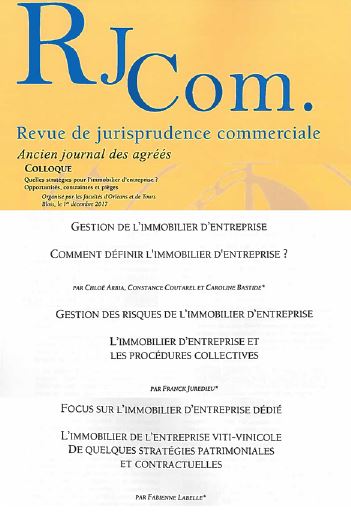 “Conference - What strategy for commercial real estate? Opportunities, constraints and pitfalls”, Eds. Fabienne LABELLE and Franck JUREDIEU RJCom. March-April 2018 - No. 2
“Conference - What strategy for commercial real estate? Opportunities, constraints and pitfalls”, Eds. Fabienne LABELLE and Franck JUREDIEU RJCom. March-April 2018 - No. 2Publisher: Thomson Transactive
Abstract : At a time of dematerialization of exchanges and telework, it may seem strange to devote a conference to company real estate, the concrete showcase of economic activity. There is little doubt that contemporary commercial real estate is rarely valued architecturally. Its usefulness is often characterized by its location and functionality. It is precisely when it becomes critical to the development of an economic activity that it represents an essential value for the company. So, commercial real estate is at the heart of legal and fiscal strategies. Without constituting a legal category as such, it represents an asset and managing it can be problematic Moreover, it is exposed to specific risks. [...]

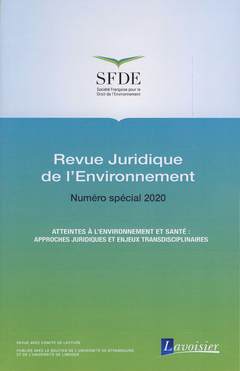 Damage to the Environment: legal approaches and transdisciplinary issues, Proceedings of the Colloquium (21-22 November, 2019 ) at the initiative of the IRJI of the University of Tours and the support of the Iris of the University of Paris 13
Damage to the Environment: legal approaches and transdisciplinary issues, Proceedings of the Colloquium (21-22 November, 2019 ) at the initiative of the IRJI of the University of Tours and the support of the Iris of the University of Paris 13